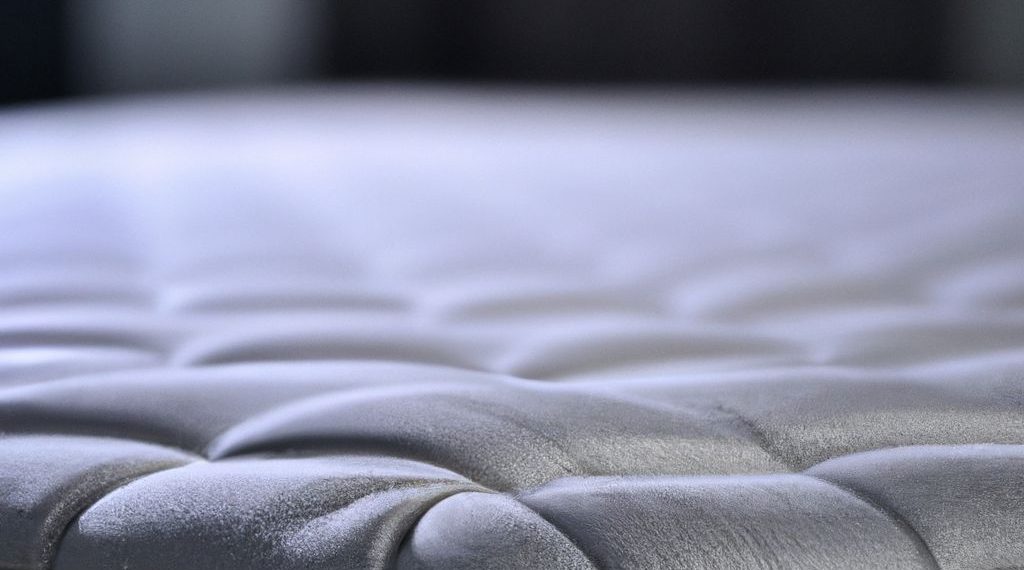Key Takeaways:
- The thickness of a full mattress is an important factor to consider when choosing a mattress, as it can greatly impact sleep quality and comfort.
- The ideal mattress thickness for different needs varies, such as thicker mattresses being more suitable for sharing a bed or for back sleepers.
- Factors such as sleeping position, size of the individual, and personal preferences should also be considered when selecting the appropriate mattress thickness.
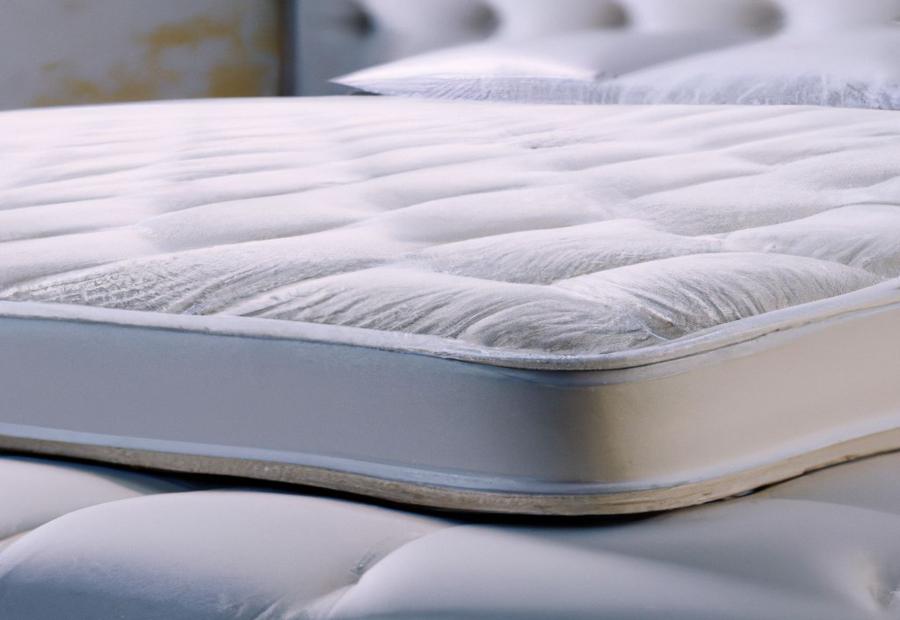
Photo Credits: Www.Mattressreviewguru.Com by Willie Jones
A well-chosen mattress thickness can make all the difference when it comes to achieving a comfortable and restful sleep. In this section, we will explore the factors that highlight the importance of mattress thickness for different needs. Additionally, we will delve into the ways in which mattress thickness can impact sleep quality and overall health. As we dive in, you’ll discover the valuable insights that will help you select the perfect mattress thickness for your specific requirements.
Importance of mattress thickness for different needs
Mattress thickness matters when it comes to individual needs. A thicker mattress is great for couples, as it provides enough space and prevents motion transfer. It also helps maintain the natural curvature of the spine for back sleepers. Low profile mattresses are ideal for those who move around a lot. Thin mattresses may be lightweight but they don’t offer enough support.
Throughout history, mattress thickness has been valued. Ancient Egyptians and Greeks created layered mattresses for comfort and support. Modern advancements have allowed for more tailored options.
It’s essential to choose the right mattress thickness for optimal sleep quality and health benefits. Otherwise, you’ll be as uncomfortable as a clown in a straight jacket!
Understanding the impact of mattress thickness on sleep quality and health
A mattress’s thickness is very important for sleep quality and health. Studies show that mattress thickness can influence sleep in many ways, like comfort, support, and spinal alignment. It also helps reduce pressure points and the risk of musculoskeletal issues.
- Support: A thick mattress offers good body support, helping keep spine alignment and avoiding back pain.
- Pressure relief: The right thickness distributes body weight evenly, reducing pressure on sensitive areas.
- Sleep quality: The right mattress thickness is a balance between firmness and softness, which makes for a comfortable sleeping surface.
- Overall health: Quality sleep is essential for wellbeing. A suitable mattress thickness can help improve physical and mental health.
The ideal mattress thickness for each person depends on things like body type, sleeping position, and medical conditions. It’s best to consult a healthcare professional or mattress expert to find the right one.
I once had a friend who had chronic back pain from using an unsuitable mattress. She switched to a thicker one, and it improved her sleep and wellbeing. This shows how important it is to understand the effects of mattress thickness on sleep and health.
Understanding Mattress Thickness
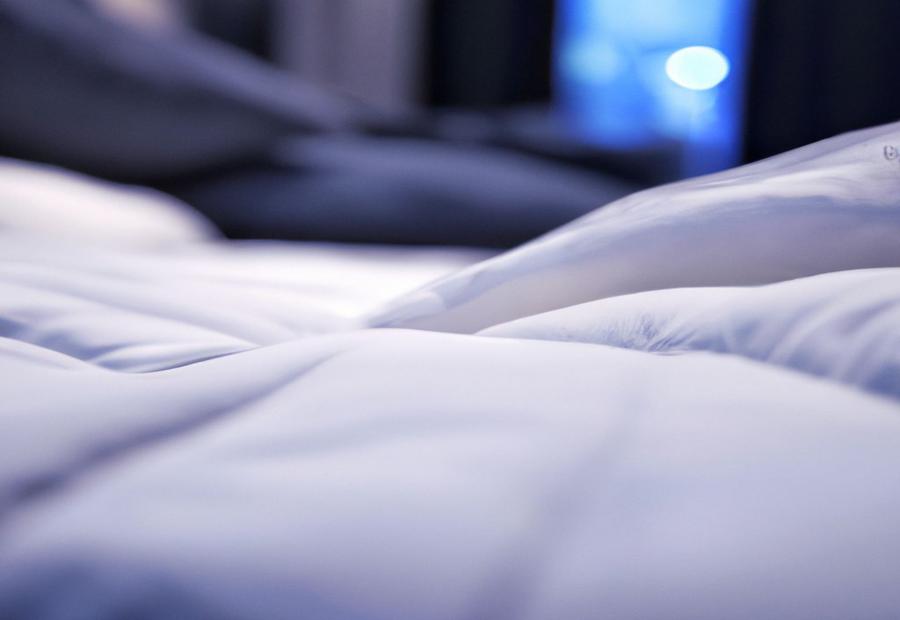
Photo Credits: Www.Mattressreviewguru.Com by Arthur Thomas
Understanding mattress thickness is crucial when it comes to selecting the right mattress for your needs. In this section, we will delve into the definition and measurement of mattress thickness, as well as the effects that different thicknesses can have on sleep quality and overall health. By exploring these aspects, we can make more informed decisions and ensure a comfortable and supportive sleep experience.
Definition and measurement of mattress thickness
Mattress thickness is the measurement of the vertical height of the mattress. It’s a vital thing to think about when selecting a mattress, as it can have a huge effect on sleep quality and comfort. Knowing how to define and measure mattress thickness is key to making the right decision.
- To measure the thickness of a mattress, you look at the distance from the top to the bottom.
- Thicker mattresses generally have more cushioning and support, while thinner ones tend to be firmer.
- Mattress thickness can differ across brands and models. Common sizes range from 6-14 inches for standard mattresses and up to 18 inches for higher-profile options.
- People with joint or back pain often prefer thicker mattresses.
- Thinner mattresses may be best for those who like a firm feel, or if they have weight restrictions, such as for bunk or trundle beds.
Mattress thickness is important, but not the only thing to consider. Things like sleeping position, body weight and personal preference should also be taken into account. Some mattresses have specific thickness recommendations based on bed size and user demographics. Taking all this into consideration will help you make an informed decision that fits your comfort and support needs.
Effects of different mattress thicknesses on sleep quality and health
The mattress thickness is essential for sleep quality and overall health. It affects comfort, support, and spinal alignment. Plus, the pressure on the body can either reduce or increase pain.
A thicker mattress gives more cushioning and support. This is beneficial for people with conditions such as arthritis or back pain. If a mattress is too thin, it won’t provide the right support, leading to poor sleep and discomfort.
The mattress thickness also influences spinal alignment. If it’s too thick, the spine will curve in an unnatural way, causing health issues. If it’s too thin, it won’t provide enough support for proper alignment.
When selecting a mattress, individual needs are important. Consider body weight, sleeping position, and preferences. Those who share a bed may need a thicker mattress to fit different needs and body types.
In summary, the ideal mattress thickness depends on individual needs and preferences. Finding the right balance is essential for good sleep and health benefits. So, choose the appropriate mattress thickness to prioritize a good night’s sleep.
Recommended Mattress Thickness for Different Needs
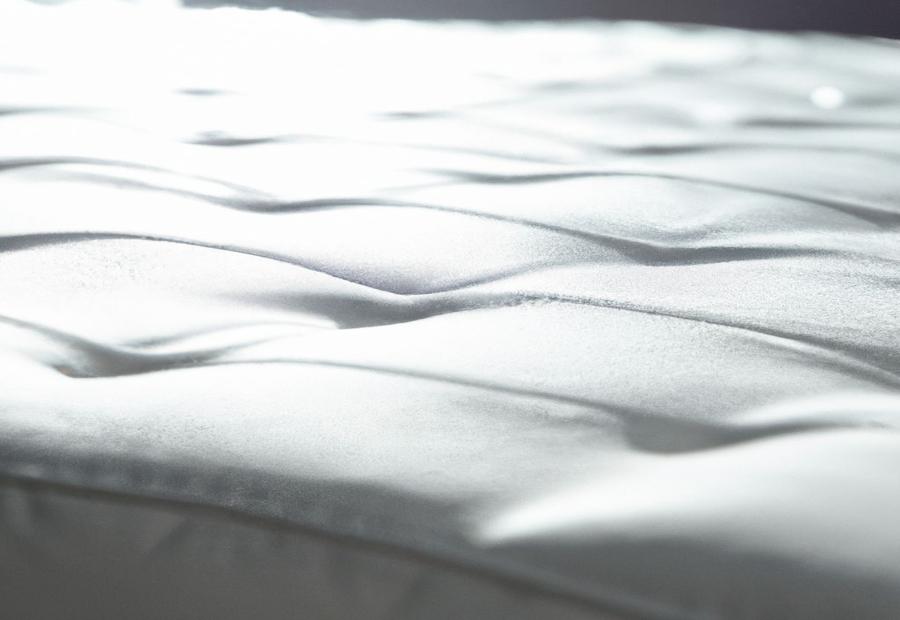
Photo Credits: Www.Mattressreviewguru.Com by Patrick Rivera
When considering the ideal thickness for a mattress, it’s crucial to understand the specific needs and situations that different individuals may have. In this section, we will delve into various scenarios, ranging from shared beds to back sleepers, short adults, pregnant women, children’s beds, and even trundle beds. By exploring these distinct needs, we can better determine the recommended mattress thickness for each situation and ensure optimal comfort and support for everyone involved.
Ideal mattress thickness for share a bed situations
Choosing the ideal mattress thickness for shared beds needs careful consideration. Comfort and support for both people should be taken into account. The mattress should cushion you well and have enough support for good spinal alignment.
Weighing up the weight of both individuals is important too. A thicker mattress may be better if one person is heavier. However, a thinner mattress could be good for those who are lighter or have different comfort needs.
Motion isolation should also be considered. A thick mattress that isolates motion can prevent disruption when making a full size mattress into a queen one person moves or gets in and out of bed.
Personal preferences mustn’t be overlooked. Some people might like softer cushioning, while others prefer a firmer surface for support. Generally, the ideal thickness for shared beds would be between 10 to 14 inches.
Back sleepers need to find the right mattress thickness to get a good night’s rest without feeling spineless. Balance of comfort, support, motion isolation, and personal preferences is critical.
Suitable mattress thickness for back sleepers
Back sleepers need the ideal mattress thickness for support and spine alignment. Here are five points they should consider:
- Spinal alignment: A mattress too thin provides insufficient cushioning, leading to discomfort and misalignment. If too thick, there can be too much sinkage and no support.
- Medium-firm: Back sleepers generally find medium-firm mattresses best, as they offer balance between comfort and support. The mattress thickness should complement this.
- Body weight: Heavier back sleepers may need thicker mattresses to avoid excessive sinkage and ensure support. These promote weight distribution, comfort and reduce the risk of pain.
- Temperature: Mattress thickness should help with airflow and heat dissipation. Thicker mattresses usually have cooling tech for regulating body temp throughout the night.
- Preference: Personal preference plays a role in choosing the right mattress thickness. Some prefer a plusher feel, while others prefer a firmer surface for support.
Considering these factors helps back sleepers select a mattress thickness to suit their needs, enabling restful nights with optimal spine alignment and comfort.
Adequate mattress thickness for short adults and pregnant women
Short adults need a mattress that is neither too thin nor too thick. 8-10 inches is ideal. This gives proper support and minimizes stress on the body.
Pregnant women benefit from a thicker mattress – 10-12 inches. This helps with their growing belly and lessens joint pressure.
The right thickness for adults and pregnant women also depends on their body type and personal preference. It’s important to try options and get the right balance between softness and firmness.
Besides thickness, material composition, edge support, and motion isolation should also be taken into account when choosing a full bed mattress.
Consulting a healthcare professional or sleep specialist is a great way to pick the right mattress thickness for individual needs.
Recommended mattress thickness for most adults
Adults should think about mattress thickness when picking the perfect sleep set-up. Usually, 10-12 inches is seen as the best thickness for adults. Too thin and it won’t support your body weight or sleeping position. Too thick and it can be too soft or sink in too much.
Medium firmness mattresses are often the best choice. However, body weight and sleeping position can change the ideal thickness. Heavier folks or side sleepers should go for thicker mattresses. It’s like Goldilocks’ porridge hunt. But instead of hot, cold, and just right, it’s thin, thick, or perfect.
Knowing these factors helps adults get the perfect mattress thickness for better sleep and health.
Suitable mattress thickness for children’s beds and trundle beds
It’s vital to consider mattress thickness when selecting bedding for your child. This impacts comfort, support, and sleep quality as they grow. You need to think of factors like age, weight, and sleeping position. Generally, medium thickness is best. Too thin can mean inadequate cushioning, too thick an uncomfortable surface.
When picking a material, foam mattresses are great. They provide contouring support and pressure relief. For trundle beds, take into account the space under the bed during storage. A thicker mattress provides seamless storage with no loss of sleep quality.
To find the perfect balance between comfort and minimal vertical clearance, look at the child’s needs. Also consider storage requirements of trundle beds. This’ll help you make an informed decision.
Ideal mattress thickness for short people
Short people need the right mattress thickness for a good night’s sleep. Thinner mattresses are usually better, as they allow for proper spine alignment. A medium-firm mattress is ideal, as it provides comfort and support. Weight should also be taken into account when selecting mattress thickness. Specialty mattresses designed for short people may have unique materials and designs that suit their needs.
Choose the right mattress thickness to get the best sleep. Make sure it’s comfortable and supportive for your body. Don’t settle for anything less than what you deserve – invest in a mattress that caters to your shorter stature. With the right thickness, you’ll wake up feeling refreshed and ready for the day!
Factors to Consider When Choosing Mattress Thickness
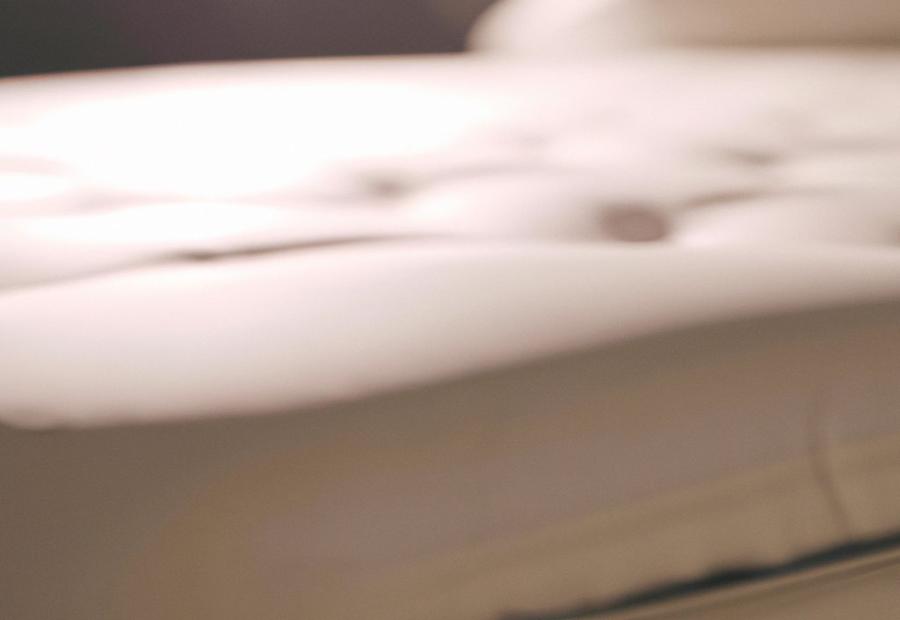
Photo Credits: Www.Mattressreviewguru.Com by Mark Roberts
When choosing a mattress, considering its thickness is crucial for optimal comfort and sleep quality. In this section, we’ll explore the factors to consider when selecting mattress thickness. We’ll discuss the importance of taking your sleeping position into account and the impact that mattress thickness can have on your overall sleep quality and health. So, let’s dive into the key aspects of mattress thickness and how it can make a difference in your sleeping experience.
Importance of considering sleeping position when choosing mattress thickness
Mattress thickness matters! It impacts your sleep quality and comfort, depending on your sleep position. So, you must understand the importance of considering sleeping position when selecting full size mattress thickness.
For example, back sleepers need more support for proper spinal alignment. Thus, choosing the right thickness is essential for their restful sleep.
Short adults and pregnant women have unique needs and require mattresses of a specific thickness. Too thick may be difficult to enter/exit, while too thin won’t provide adequate support.
Also, if you share a bed with a partner or have young ones, then motion transfer and space constraints come into play. Selecting mattresses of the right thickness can optimize your sleeping experience and ensure undisturbed rest.
Bottom line: Thick or thin, your mattress is dictating your sleep quality and health!
Impact of mattress thickness on sleep quality and health
Mattress thickness affects sleep quality and overall health. This article looks into how mattress thickness influences sleep and wellness. It’s great info for customers to make informed decisions.
- 1. How mattress thickness affects sleep quality:
- 2. Health implications:
- 3. Consider individual needs:
Different mattress thicknesses can have varied impacts on sleep quality. A thick mattress provides more cushioning and support. This can improve spine alignment, reduce pressure points and enhance sleep quality.
Mattress thickness has many links to health. A thicker mattress may help with back pain and posture. People with health conditions like arthritis or fibromyalgia may benefit from a thicker mattress too.
It’s important to think about individual needs when selecting mattress thickness. For example, people who share a bed need a thicker mattress. Back sleepers may enjoy a medium-thick mattress with optimal support.
Pregnant women and shorter adults may find a slightly thicker mattress more comfortable.
Pro Tip: Try out different mattress thicknesses before buying one to get the best comfort and support.
Advantages and Disadvantages of Different Mattress Thicknesses
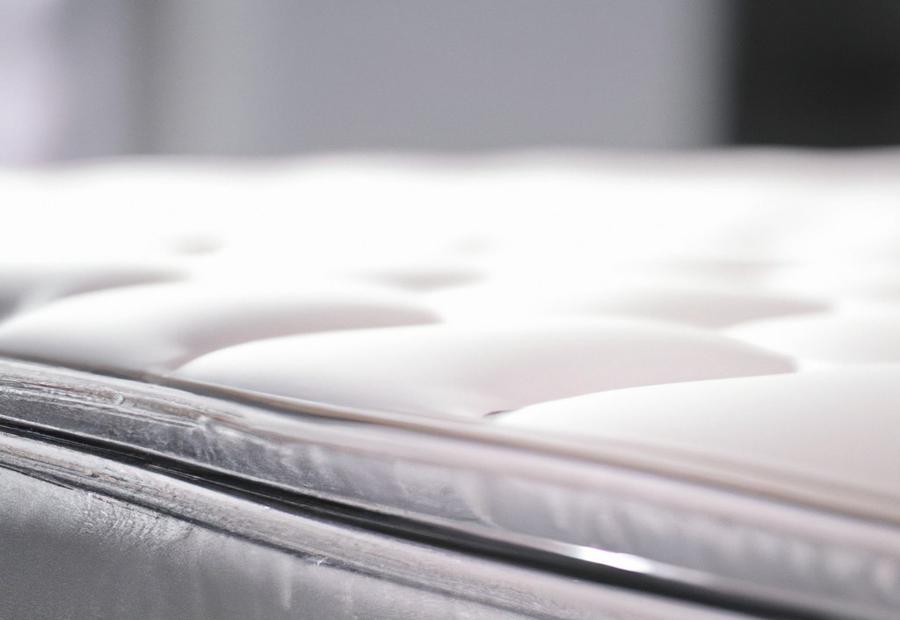
Photo Credits: Www.Mattressreviewguru.Com by Alexander Lee
When it comes to mattress thickness, there are advantages and disadvantages to consider. Whether you prefer a thick, low-profile, or thin mattress, each option has its own set of pros and cons. In this section, we will delve into the specific benefits and drawbacks of different mattress thicknesses, allowing you to make an informed decision based on your personal preferences and needs. So, let’s explore the world of mattress thicknesses and their impact on your sleep experience.
Benefits of thick mattress
Thick mattresses offer lots of perks for sleep quality and health. It’s the measurement from top to bottom of the mattress that matters. Here are some advantages of thick mattresses:
- They provide comfort and support, especially for those with sore backs or joints. The additional cushioning helps spread body weight and ease pressure points.
- The extra layers absorb any motion, so couples can sleep without disturbances.
- Thick mattresses have thicker comfort layers for an extra-luxurious feel.
- There’s more room for airflow, which aids temperature regulation.
- Thick mattresses usually last longer due to their construction and materials.
- They provide better edge support for full utilization of the sleeping surface.
When choosing the right thickness, consider what’s best for you. Your body weight, sleeping position, and health conditions all factor in.
Drawbacks of thick mattress
A thick mattress may have some drawbacks to think about when making a buying choice. For example, its weight is often higher, making it hard to move or rotate, especially for solo dwellers and those with limited mobility. Additionally, thicker mattresses tend to be pricier than thinner ones, which can be a problem for budget-conscious shoppers.
Firmer sleepers may also face challenges with a thick mattress since the extra thickness can make it softer, not providing enough support. Also, if you sleep hot, a thick mattress is not ideal since it can limit airflow and retain heat, making for an uncomfortable night.
Despite the drawbacks, thick mattresses can bring comfiness and pressure relief. That said, it’s important to consider personal needs and preferences, budget, sleep position, and other factors that influence sleep quality before deciding on mattress thickness. With the right knowledge, you can make a well-informed decision and benefit from better sleep health and well-being.
Advantages of low profile mattress
Go low with a low profile mattress! It offers easy accessibility and a comfortable height. Plus, it’s budget-friendly and compatible with various bed frames, headboards, and fitted sheets. Get a modern look in your bedroom with its sleek design.
Fitting fitted sheets is easier with a low profile mattress. Standard-sized sheets fit snugly, without excess fabric or bunching up. That means a better look and more comfort during sleep.
Think about your personal preference and individual needs when selecting the best mattress thickness. Sure, a low profile mattress brings you closer to the floor. But, remember: it’s not the fall that hurts, it’s the lack of comfort!
Disadvantages of low profile mattress
Low-profile mattresses have some cons to consider before buying.
- They may not give enough support for those with health issues like back pain or joint issues. The thinness may not cushion and support enough, leading to discomfort and worsening health issues.
- Soft-sleepers may not like low-profile mattresses. Their thinness may not offer enough padding, and they may feel too firm. This can mean an uncomfortable sleep and a disrupted sleep quality.
- Durability can be a worry. With less material and padding, these mattresses can wear out quickly. Over time, this can cause sagging or indentations, resulting in discomfort and shortening its lifespan.
It’s important to think about your needs and preferences before buying a low-profile mattress. Test it in-store or read reviews online to get an idea of its comfort and durability. Protecting it with a mattress cover, and regularly rotating it, can help keep it in good condition and extend its life.
Thin mattresses may not have much substance, but they’re ideal for folks who like sleeping on a tortilla chip!
Pros of thin mattress
Thin mattresses have some advantages. They are often cheaper than thicker ones, which is good for those on a budget. They are also easier to move and transport, making them great for people who move a lot or need to change their living space. Lastly, people who like a firmer sleeping surface can get great support from a thin mattress.
Advocates of thin mattresses say they help with spine alignment and reduce back pain. They also let more air circulate around the body, making for a cooler sleep.
However, a thin mattress may not have enough cushioning for those with certain health conditions, like arthritis or chronic pain. If this is you, then you should consult with a healthcare professional before choosing your mattress.
Pro Tip: Consider using bedding accessories like mattress toppers and pillows. This will let you have the benefits of a thin mattress with more comfort and support. After all, it’s a thin line between discomfort and a thintastic sleep experience.
Cons of thin mattress
Thin mattresses have several drawbacks to consider. These can affect sleep quality and comfort.
- For instance, they may lack support for individuals with certain health conditions or sleeping positions.
- Plus, thin mattresses are often less cushioned than thicker ones, causing discomfort and pressure points.
- They may also have poorer durability, more noise transfer, limited motion isolation, and reduced versatility.
All of these drawbacks should be taken into account when selecting a thin mattress.
It is worth noting that thin mattresses may not provide adequate spinal alignment and pressure relief. This can lead to back pain and joint stiffness. When picking a mattress thickness, take into account your needs and preferences. This will help you make a choice that optimizes sleep quality and well-being.
A friend of mine bought a thin mattress for their guest room. They wanted to save money, but it ended up being uncomfortable. Guests reported sore backs after sleeping on it. It’s important to keep cost and thickness in mind when choosing a mattress.
Understanding Mattress Sizes and Thickness
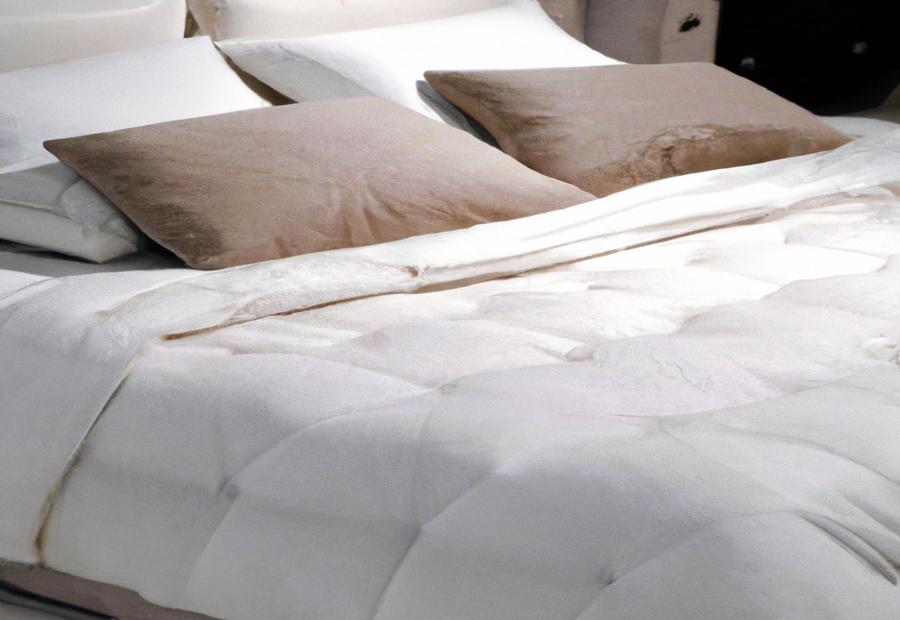
Photo Credits: Www.Mattressreviewguru.Com by George Wright
When it comes to understanding mattress sizes and thickness, it’s essential to consider the relationship between the two and the factors that influence mattress thickness based on sizes. In this section, we’ll delve into these aspects, shedding light on the insights provided by the reference data. By exploring the dimensions and variables involved, we can gain a better understanding of how thick a full mattress typically is and the underlying factors that contribute to its thickness.
Relationship between mattress sizes and thickness
The size of a mattress affects its thickness. It is vital to know how this connection works. It impacts sleep quality and general comfort.
Factors influencing mattress thickness depend on size. Bigger mattresses need more material to be durable and provide support. Different sized mattresses have different recommended thickness for specific body types and sleep positions.
Manufacturers give advice on picking the right thickness for king mattress pad size. This ensures people get the right bed and sleep needs.
The size and thickness of a mattress must be taken into account. This guarantees the best sleep quality. It offers support and alignment for restful sleep.
In conclusion, mattress size and thickness are directly related. Understanding this helps people pick the right mattress. Looking at both size and thickness is essential to achieve optimal comfort and support for a great night’s sleep.
Remember, choose the right mattress thickness! Otherwise, you’ll be sleeping on a cloud or a rock – neither of which is ideal.
Factors influencing mattress thickness based on sizes
Factors that determine mattress thickness vary depending on size. This is an important detail when selecting the perfect mattress for specific needs, as it affects sleep quality and health. Let us create a table to show this:
| Mattress Size | Factors Influencing Thickness |
|---|---|
| Twin | – Available space |
| Full | – Comfort preference |
| Queen | – Body weight |
| King | – Sleeping position |
This table gives us a glimpse of how different mattress sizes are tied to their thickness. Twin mattresses are often determined by available space. Comfort preference is the influence for full-size mattresses. Queen-size mattresses may be chosen based on body weight. Lastly, sleeping position is essential when picking the right thickness for king-size mattresses.
Other factors can also have an impact on mattress thickness. Couples sharing a bed must look at the best thickness that fits both of them. People who mainly sleep on their back might need a certain thickness for spinal alignment.
When deciding on the right thickness, seek help from a professional and consider personal details such as height and weight. Additionally, be aware of how mattress thickness influences sleep quality and health.
Fit a sheet to your mattress thickness is like trying to fit a square peg into a round hole, but with more stress and less math.
Considerations for Fitted Sheets and Mattress Thickness
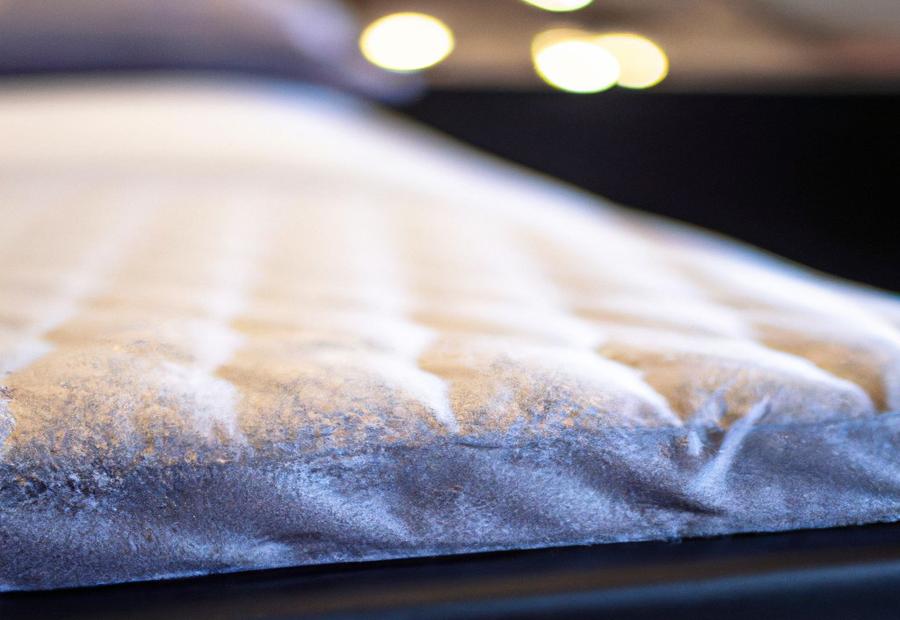
Photo Credits: Www.Mattressreviewguru.Com by Jack Perez
Considering the thickness of your mattress is crucial when choosing fitted sheets. In this section, we will explore the importance of this aspect and discuss suitable fitted sheet options for different mattress thicknesses. By understanding these considerations, you can ensure a perfect fit for your mattress and enhance your overall sleep experience.
Importance of considering mattress thickness when purchasing fitted sheets
When buying fitted sheets, mattress thickness matters. It impacts the fit and performance of the sheet. If too thick, the sheet won’t stretch enough to secure itself to the mattress corners.
So get fitted sheets designed for your mattress thickness. They ensure a snug fit and no slipping or bunching up during sleep. Sheets that don’t fit can be uncomfortable and cause wrinkling. Plus, they allow dust and dirt to accumulate.
Look for sheets made with stretchable materials. They give a smooth and wrinkle-free surface. Mattresses come in different thicknesses, so you need sheets that match it.
Pro tip: Measure your mattress’s thickness, including any extra padding or cushioning layers. That way you can select fitted sheets that fit both the base and extra layers.
Forget those sleepless nights! We’ve got fitted sheets for every mattress thickness.
Suitable fitted sheets for different mattress thicknesses
When buying fitted sheets, mattress thickness is key. This is because different thicknesses require different sheets. For instance, thicker mattresses may need deeper pockets or larger sizes for a secure fit. Thinner mattresses may require shallower pockets or smaller sizes.
To help figure out the right fitted sheet size for different mattress thicknesses, one can use a table. This should have columns for the mattress thickness range and the recommended sheet size or pocket depth. By looking at this table, individuals can easily select the ideal fitted sheet size for their mattress thickness.
Apart from mattress thickness, sleeping position and personal preferences should be taken into account when selecting fitted sheets. This can further aid in finding suitable options for different mattress thicknesses.
In conclusion, determining the right fitted sheets for different mattress thicknesses requires assessing the mattress measurements and picking sheet sizes or pocket depths that provide an optimal fit. Factoring in sleeping position and personal preferences can make for a more comfortable bedding experience.
Conclusion
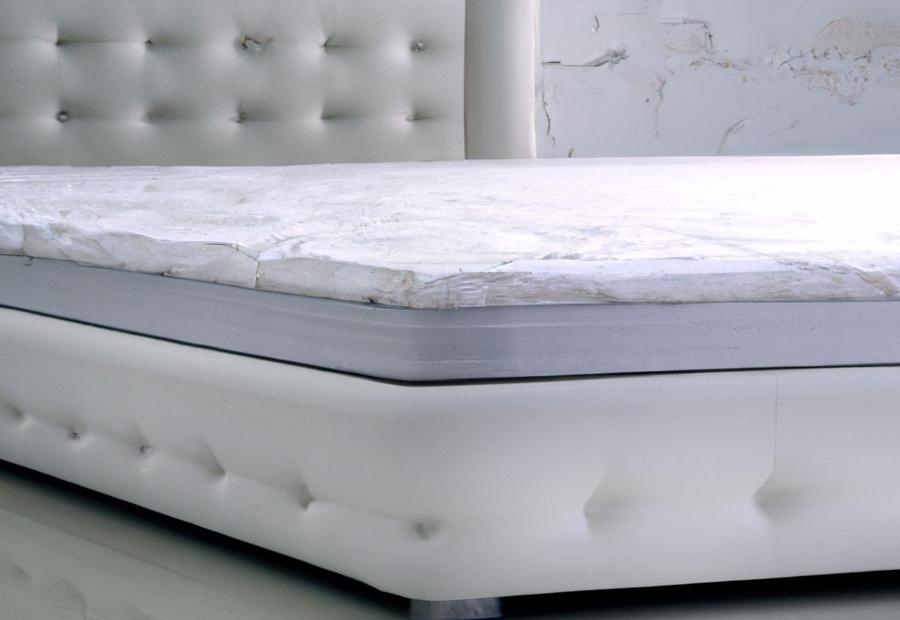
Photo Credits: Www.Mattressreviewguru.Com by Vincent Sanchez
To sum up, the depth of a full mattress can vary. Generally, they’re 8-14 inches thick, so people can pick one that matches their comfort needs and preferences. Folks who love a softer sleep might go for thicker mattresses, while the thinner ones are better for those who like a firmer feel.
Apart from that, the quality and structure of the mattress also affect comfort and support. So, it’s important to think about body type, sleeping position, and desires when choosing the thickness.
Jane, a customer, got a 12-inch full mattress and was pleased. The extra depth gave her excellent support and comfort, relieving pressure points and reducing back pain. This shows how important it is to consider thickness when picking the right mattress.
Some Facts About How Thick is a Full Mattress:
- ✅ The standard thickness of a full mattress is 8 to 12 inches. (Source: Team Research)
- ✅ Thicker mattresses, around 12 to 20 inches, are suitable for side sleepers and heavy individuals. (Source: Team Research)
- ✅ Thinnest mattresses, around 2 to 5 inches, are recommended for cribs or occasional use. (Source: Team Research)
- ✅ Extra thick mattresses over 20 inches are generally unnecessary for most sleepers. (Source: Team Research)
- ✅ The ideal mattress thickness depends on factors such as body weight, sleeping position, and personal preferences. (Source: Team Research)
FAQs about How Thick Is A Full Mattress
How thick is a full mattress suitable for children’s beds?
A full mattress suitable for children’s beds typically has a thickness ranging from 5 to 8 inches.
Does a thicker mattress ruin sleep quality?
No, a thicker mattress does not necessarily ruin sleep quality. The ideal mattress thickness depends on individual preferences and factors such as body weight, sleeping position, and health conditions.
Can the thickness of a mattress impact health?
The thickness of a mattress alone does not have a direct impact on health. However, the right mattress thickness can contribute to comfort and support, which are important for maintaining good spinal alignment and reducing pressure points during sleep. This, in turn, can positively affect overall health.
What are 14-inch mattresses suitable for?
14-inch mattresses are considered thick and are suitable for side sleepers and individuals who prefer a more plush and luxurious sleep surface.
Are mattresses with a thickness of 20 inches or more necessary for most sleepers?
No, mattresses with a thickness of 20 inches or more are typically unnecessary for most sleepers. They are usually not recommended unless there are specific requirements or preferences for an extra thick mattress.
Is mattress thickness important for stomach sleepers?
Yes, mattress thickness is important for stomach sleepers. They generally require a firmer mattress with adequate support to prevent excessive sinking of the abdomen and maintain proper spinal alignment. A thickness of 8 to 12 inches is typically suitable for stomach sleepers.

